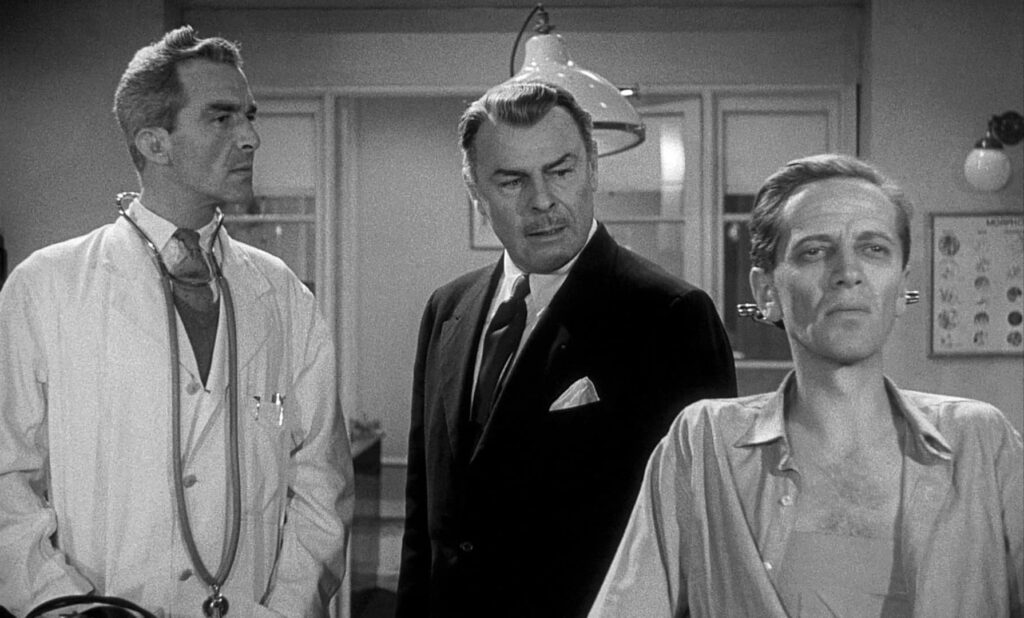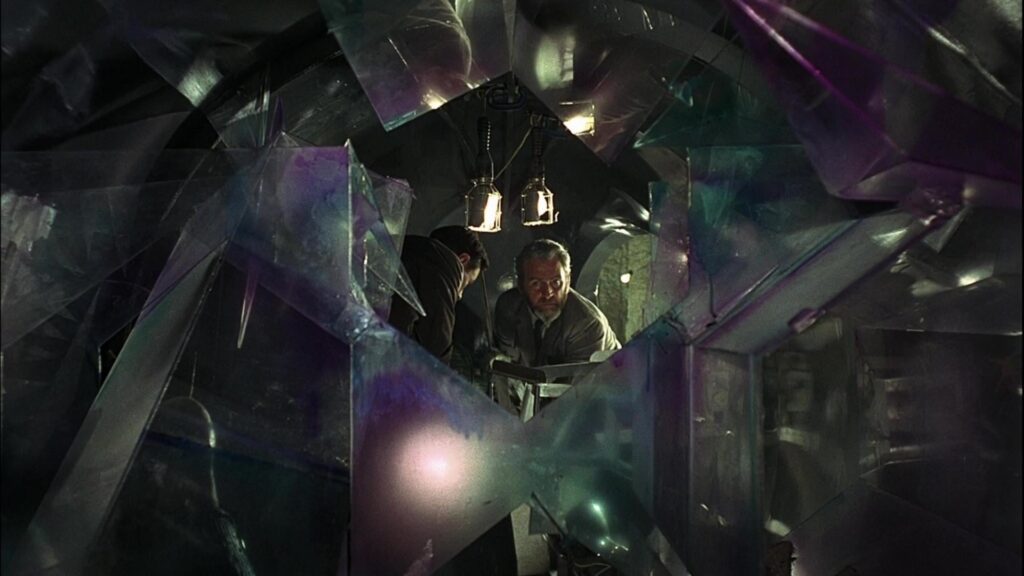Professor Bernard Quatermass is a fictional scientist featured prominently in a series of early 1950s BBC science fiction serials. He’s the head of the British Experimental Rocket Group and he continually finds himself dealing with strange alien plots to take over the world or destroy humanity. There were three 6-episode serials aired on BBC television in the 1950s, and each of them were condensed and remade by Hammer Film Productions for the cinema. There have been a couple of revivals and remakes over the intervening decades, but it actually seems ripe for a more modern interpretation.
I first heard of Quatermass from an interview with John Carpenter a while back. I can’t find that article anymore, but Quatermass clearly made an impression on a young Carpenter, who would go on to make a few films that clearly show that influence (notably Prince of Darkness and maybe even The Thing). It all certainly sounded intriguing, so let’s take a look at a couple of these suckers:
The Six Weeks of Halloween: Week 1.5 – Quatermass
- Invasion of the Bunny Snatchers (Looney Tunes Short)
- Invasion of the Body Snatchers (1956 Trailer)
- The Blob (1958 Trailer)
The Quatermass Xperiment – The first manned British spacecraft is presumed lost in space until it crashes into a farmer’s field. British authorities arrive, led by Professor Quatermass, and manage to pry open the craft, finding only one of the three crewmembers. The sole survivor is unable to speak and appears to be going through some sort of agonizing physical metamorphasis. What happened to the other two crewmembers? What will become of the survivor? Only Professor Quatermass can save the day!

An early example of British Sci-Fi, this does predate a lot of things that are more famous. For instance, the Cold War assimilation themes of Invasion of the Body Snatchers are featured here in a similar way (albeit, to my mind, in a less effective manner). There’s just something quaint about this era of science fiction film. Scientists in suits battling rubber monsters, luddite politicians and cops, retro futuristic technology, it’s all in good fun.
All that being said, it’s not the most exciting film, especially in the early proceedings. Lots of jabbering and exposition, which, to be fair, is a hallmark of the genre, but there are more effective versions of that sort of thing. The pacing gets a bit tedious and it doesn’t really pick up until the end, which is suitably engaging. There are some interesting ideas tossed off here and there that could certainly fire up the imagination, such that it’s easy to see how so many future filmmakers were inspired by this series. Fans of early Doctor Who will probably also get a kick out of this, a clear precursor to that more famous series.
The actor they got to play Quatermass was an American named Brian Donlevy, which may have helped Hammer sell the film more effectively in foreign markets, but was definitely controversial back at home. Quatermass creator Nigel Kneale infamously hated the decision, and I will say that I think I can see his point. Donlevy would reprise the role in the sequel, but was eventually replaced, and it does seem like a clear case of miscasting.
Ultimately, it’s interesting that this micro-budget British SF B-Movie casts such a long shadow and displays a considerable influence on the genre, but it does seem like one of those things that would only be of interest to students of the genre. There are pleasures to be had here, to be sure, but I was certainly hoping for more. **
- The Simpsons: Treehouse of Horror: Hungry Are the Damned (Disney+)
- War of the Worlds (2005 Trailer)
- Invaders from Mars (1953 Trailer)
Quatermass and the Pit – A construction crew working in the London Underground unearth an ancient Martian spaceship. As Quatermass and team explore its mysteries, it appears to exert a psychic influence on those around it. Will the same fate of these doomed Martians befall humanity?

Made a dozen years later, this film boasts several improvements over the first movie. Quatermass is now played by Scottish actor Andrew Keir, who seems to be almost universally recognized as a better fit for the role. Director Roy Ward Baker also does a bit better with the visuals, despite a clearly limited budget. This is in color, which isn’t inherently better than black and white or anything, but it does look more appealing and you can tell why Hammer is known for its vivid colors. This does still retain that early Doctor Who hokeyness, and the pacing remains a bit sluggish at times as well.
Even though the effects aren’t particularly great, and the Martian creature designs are a bit lacking, the psychic playback of the last days of life on Mars is genuinely unnerving and even a little surreal. That otherworldly quality is captured a few times throughout the film, and it can be quite effective. As with the first film, there are some interesting ideas explored here.
Again, this is a favorite film of filmmakers like John Carpenter and Joe Dante and you can see the influence in their work for sure. While this is an improvement over the first film and is generally regarded as the best Quatermass, I still think it is mostly of interest to students of the genre or folks who want to trace influence within science fiction and horror. Which, like, I am, so I enjoyed myself well enough, but it’s not something I’d recommend over other classic 50s alien invasion flicks. **
I did not get to Quatermass II, but feel pretty confident that I would have a similar feeling about that one. This basically wraps up the Hammer Horror portion of this year’s Six Weeks of Halloween. Next up: Giallo Essentials, the cinema of my people! See you on Sunday…
I watched all the Quatermass movies years back and found them all pretty droll. (Though The Pit was my favorite of the trio.) Definitely due a rewatch. I know a certain breed of classic horror/sci-fi fans swear by this series, so I need to give them a rewatch with more mature eyes.
“Droll” is probably the perfect one word review of both of these, but yes The Pit was clearly the better film. It’s good to see these with an eye towards the influence the clearly had, but yes, it’s droll stuff…